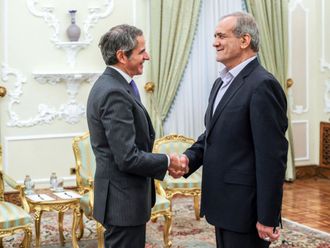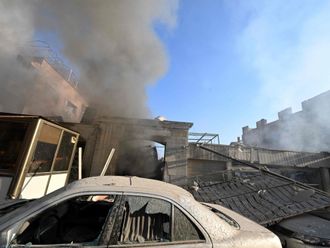New York: Human Rights Watch has urged Libyan authorities to reveal during an Arab summit it is hosting this weekend the fate of missing people, including a prominent Lebanese Shiite cleric.
The New-York based rights watchdog said Libya should also provide information about two of its own citizens who went missing 20 years ago after they were returned home from Egypt where authorities had arrested them.
"One of the themes of this Arab League summit is reconciliation," HRW Middle East and North Africa director Sarah Leah Whitson said in a statement released late Friday.
"Libya should use this opportunity to inform the families who have been suffering the pain of not knowing where their loved ones are," she added.
Lebanese President Michel Sulaiman is boycotting the summit in Sirte amid a lingering dispute with Libya over the disappearance of prominent cleric Imam Mussa Sadr, and has sent his country's ambassador to Cairo instead.
Sadr, who is still regarded by Lebanon's Shiites as a key spiritual guide, vanished on August 31, 1978, amid mysterious circumstances and was last seen in Libya.
In 2008 Lebanon issued an arrest warrant for Libyan leader Moamer Kadhafi over Sadr's disappearance while he was in Tripoli with two companions, who also went missing.
Libya has denied involvement in Sadr's disappearance. It says the man left the country for Italy, but the Italian government has always denied he arrived there.
However, in 2004 Italian authorities returned a passport found in Italy belonging to the imam.
HRW acknowledged that Libyan authorities began in 2008 "for the first time" to address the case of hundreds of people who disappeared "in connection with a massacre at the Abu Salim prison in 1996."
"Over the past year, the authorities have informed at least 800 families that their loved ones perished at the prison in 1996, offering compensation in exchange for relinquishing any legal claims. However, many other Libyan disappearance cases remain unresolved," it said.
It specifically mentioned Libyan opposition figures Jaballa Hamed Matar and Izzat Al Megaryef, who it said were arrested by Egyptian security forces in Cairo in March 1990.
"Their families later learned that Egyptian security forces had handed them over the next day to Libyan security officials, who detained them in Abu Salim prison," HRW said, adding they have not been heard of since.
"Disappearances are a continuous crime for which the Libyan government is responsible," Whitson said.
She urged Libya to "tell the truth about what happened to these victims" and to "provide reparation and prosecute those responsible for their disappearance."












